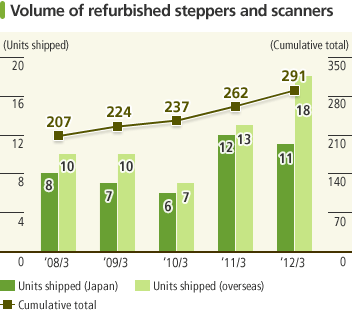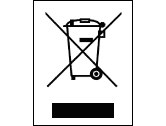Recycling and Packaging Measures
Reuse and recycling of used products
Supplying products the world over, Nikon is working tirelessly to reduce the total environmental impact of its products and services by reusing and recycling used products.
Sales of refurbished steppers and scanners

In the year ended March 31, 2001, the Nikon Group launched a commercial service for collecting used Nikon steppers and scanners from customers, reconditioning them, replacing parts, reconfiguring them, and installing them for new customers in Japan and overseas. This exemplifies Nikon's practice of reusing its own products. As of the year ended March 31, 2012, Nikon had shipped a cumulative total of 291 refurbished steppers and scanners.
Battery recycling
In Japan, Nikon Corporation has been cooperating with JBRC* and a number of other companies to collect end-of-life secondary batteries, including those used for Nikon digital cameras, from users for recycling.
- *JBRC
The Japan Portable Rechargeable Battery Recycling Center, an incorporated association that promotes the recycling of small rechargeable batteries based on the Law for Promotion of Effective Utilization of Resources.
Recycling of used Nikon products

WEEE symbol
Under WEEE Directive*, European countries have been developing national laws in relation to the collection and recycling of used electronic products. In response to these laws, we have been working to fulfill our responsibility for the collection and recycling of Nikon digital cameras and other products. Since 2005, the Nikon Group, led by a group company in the Netherlands, has been preparing nation-specific measures to meet its collection and recycling obligations for digital cameras and other Nikon products. We have established a collection and recycling system in more than 25 countries, registering with local collection organizations.
The Nikon Group will continue taking appropriate measures in the future for the collection and recycling of used products.
- *WEEE Directive
This directive, which mandates manufacturers to recover and recycle "Waste Electrical and Electronic Equipment" in and after August 2005, was enacted by the EU.
Recycling of packaging materials

The Green Dot mark
The Nikon Group promotes the recycling of packaging materials for Nikon products in Japan by outsourcing the task to the Japan Containers and Packaging Recycling Association.
In Europe, under EU Directive on packaging and packaging waste, each country has developed packaging waste collection and recycling system in accordance with its national law. Many of those systems adopt the Green Dot system*. The Nikon Group cooperates in the collection and recycling of packaging materials in those countries that are members of this program by paying a collection and recycling fee to recycling organization in each country and by displaying the Green Dot mark on its product packaging.
- *Green Dot System
A collection and recycling system on packaging waste having been adopted by most of the participating countries in accordance with domestic laws under the European Directive 94/62/EC on packaging and packaging waste.
Packaging Measures

Product boxes for compact digital cameras
Nikon Corporation formulated its Environmental Policy Regarding Packaging Materials in May 1998 and revised it in June 2000 to reduce the use of packaging materials for its products.
Based on this policy, we have been engaging in various efforts to boost the loading efficiency of physical distribution. Packaging can be continuously improved by reviewing the size of product boxes so that they can be efficiently loaded onto trucks, making user manuals less bulky, and switching from conventional containers to pallets to eliminate the need for outer packaging.
In addition, we are making efficient use of recycled resources. For example, we employ a type of insertion packaging that enables the cushioning material and cardboard box to be easily separated, and use molded pulp as cushioning materials for some products.
